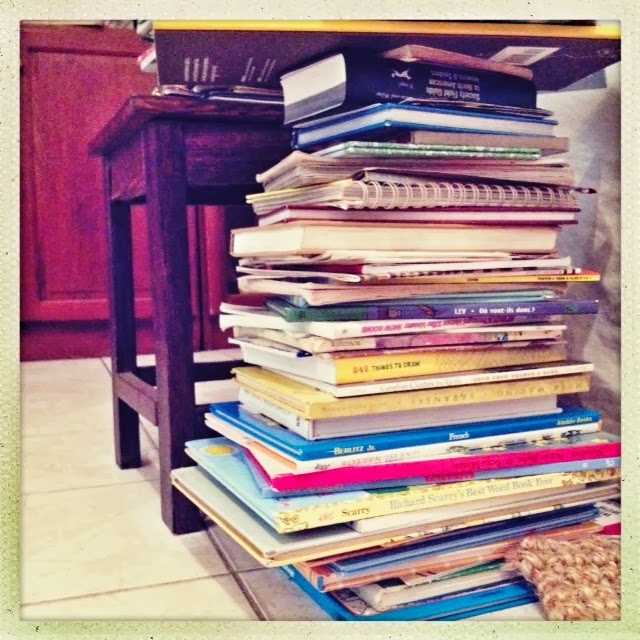Though it may seem like a good idea, here's a piece on the Inadequacy of Donating Medical Devices to Africa. Otherwise known as, "Junk for Jesus." Ha. Did you know most of that stuff breaks down almost immediately? Or no one really knows how to use it. There's gotta be a better way.
 |
| Fetus Charlotte makes her grainy debut on Soviet Era ultrasound machine (Zambia, 2009.) |
Are free yoga classes the answer? The Africa Yoga Project thinks so. Empowering communities through physical, emotional and mental wellness. Sounds just like what Kenya needs right now.
Did you know two-thirds of Americans flush public toilets with their feet? (But more importantly, one-third uses their hands?!) Just another extremely important study.
Be sure you check out the link in the article for the quiz where you get to guess the location of each international toilet. Turns out, I'm really good at this. 10/10. No big deal.
A wise person once told me that if I was going to die in Africa it wouldn't be from malaria or typhoid or fighting for your place in line (but sometimes I think that's a good possibly), but rather from a car accident. Here's a map to prove that's true.
I loved reading about this seasoned doctor's surprising fear when her son had minor surgery for ear tubes. (And it's good to know that even medical professional moms freak out a little.)
 |
| On the other side of a tonsillectomy/adenoidectomy. |
Did you catch this article this week? How to get flat abs, have amazing sex, and rule the world in 8 easy steps. My favorite message of the piece: "If you can read this, your life is pretty awesome."
Adam and I celebrated our anniversary this week. And I was reminded of my favorite quotes on marriage. One by Ben Affleck (yes, really) and the other from Nora Ephron: "Never marry a man you wouldn't want to be divorced from."
 |
I've always thought you would be a really nice person to be divorced from,
but way more awesome being married to.
(Egyptian man on left is skeptical.)
(More great Nora Ephron marriage quotes. Including a genius one about what a baby does to marriage.)
Jill's List:
I just had a "crazy-busy" week. Should I read this article for perspective? Or am I young enough that it doesn't apply to me?
 |
| Muwah models what I feel like after this week. |
When Elias was several days old, I proudly put him in my brand-new baby sling, put on his black, bad-ass baby hipster hat from Bootyland and went for a walk to Crave on Seattle's Capitol Hill. After a block or so, a stranger stopped me and asked me if she could smell my baby's head. I didn't really know what to say and so she took my silence as consent, yanked off his cap, and took a deep whiff. Two babies later, I fully appreciate the deeply addictive quality of new baby smell.
 |
| Baby Eli around time of above story. This was at a Pearl Jam concert. He was three weeks old. Wow. |
Which is a nice segue into my next link, a Rolling Stone article about the new Pearl Jam album, due on October 15th. Say what? (Nice Every Mother Counts shirt, Eddie! Thanks for the sharp eye, Mary Hope.)
We fully appreciate the power of the vaccine, living in a country where death-by-preventable-disease is rampant. And, before we moved to Congo, we were grateful for flexibility when we asked to space out the jabs. Interesting perspective.
 |
| Loulou posing as if she had just had a shot so I would have a pic for this link. Gratuitous Spiderman Band-Aids are never a bad thing. |
Speaking of the friendly family doctor... We love our doc. He is a frequent traveler to resource-poor countries and issued only excitement and sound advice - no warnings of doom and danger -when we told him we were moving to Africa with our two young children. We also think our Kinshasa family doctor is swell. (Even though the first chapter of the newest David Sedaris reminded me exactly of this old-school Belgian MD.) The experience of having a provider who understands the whole family is priceless. Too bad family medicine is a "dying speciality." Maybe we need to ease their burnout with mindfulness?
 |
| Mindfulness. South Africa-style. |
A difficult job, but one that is so important to families who experience infant loss. I feel so privileged to have photographed some of these brief lives. (Thanks, Leitzle.)
Big surprise: being poor makes your brain work poorly. Oh! So, it isn't just a bootstraps problem after all...
 |
| Selling cassava. Kinshasa. |
I really did just yell at my child, "Loulou! Put your shoes on! The creeping eruption is going to get you!" It's a real thing. Ick.
And. This. Just this. (Thanks, Matt.)



























